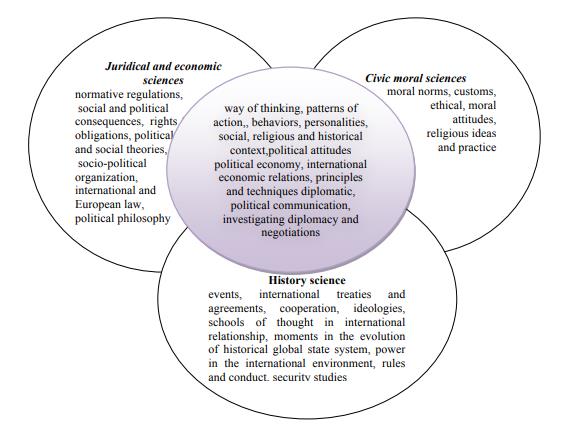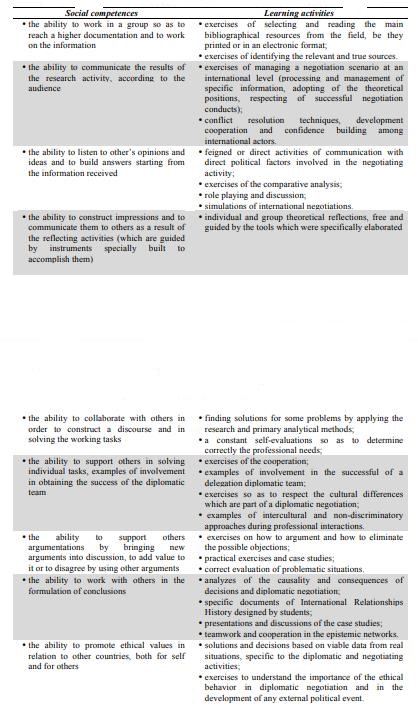Abstract
Generally, History of the International Relations as a discipline in the higher education reflects a scientific content dominated by events that explain certain political attitudes and actions among states in different periods of time. The historical context should be properly understood from the perspective of the relationship between different states. This perspective is developed today with aspects related by diplomatic codes and standing national or geopolitical or strategic interests. Our paper starts from the premise that this discipline of the academic curricula can develop the social competences of students. In this regard we have analyzed the curriculum and we made several systematic observations at the seminar activities. Based on the results obtained we proposed several contents that help development of the social and civic competences of the students. We proposed also some practical examples of teaching. In this way, we hope that our paper contribute to increasing the importance of disciplines that presented the relationships between states in different historical time.
Keywords: Historyeducationteachingcompetences
1.Introduction
The problematic of International Relationships History constitutes an essential component in the
training of the students from the History Faculty and from the Juridical and Political Sciences Faculty.
This topic is also studied in the Economics, Philosophy and Sociology Faculties, it being incorporated in
their basic subjects. Obviously, in these faculties, there are some specialties at which International
Relationships History represents the nucleus of the students’ professional training, such as the
specializations: International Relations and European Studies, Diplomacy, International Law (Berridge,
2010). In all the situations, International Relationships History targets the gathering of the specific
knowledge and abilities needed by the future experts in diplomacy (Lawson, 2010) in central and local
administration, political consultancy, specialized journalism, political analysts, researchers, advisers etc.
The success encountered by the International Relationships History is justified also by the fact that this
field ensures students an interdisciplinary training, based on building-up abilities to analyze and interpret
the political realities from multiple perspectives, such as history, diplomatic, public politics, negotiation,
international law and communication. Due to its extended and quite complex content, this field of
research has a predominant empirical character (Waltz, 2006); it lays emphasis on
interpreting the political realities from the cause - effect perspective andon reading the extended sources
epigraphic, etc.). Because of this, the students encounter difficulties in processing the information
gathered, in creating common projects, in writing down the results of their research activities and in
analyzing them, in communicating and debating them. So, this field of scientific training should also
focus on the aspects related to developing in students the abilities to relate and to communicate in the
scientific environment, and also in the public one.
2.Hypotheses. Objectives
The present paper starts from the premise that International Relationships History is a research field
which can offer multiple means to cultivate the communication and social relationship abilities, both
during seminars, and also during the professors’ lectures. In this sense, we have done a quasi-
experimental research on a sample of second year students from History, Philosophy and Theology
Faculty at University of Galati. The research meant to implement an educational program based on
methods and techniques of learning through collaboration and cooperation, during 14 weeks. The results
have been obtained by the systematic observation, oral and written interviewing (evaluation and self-
evaluation).
Our results have allowed the presentation of the didactical means to train and build-up the social
abilities needed in this field of scientific training. The following approach directions were included in the
paper:
• to identify the scientific content units which may contribute more at the development of the
social skills;
• to identify the didactical methods and techniques that stimulate and enhance communication and social relationship;
to correlate those methods and techniques with the types of learning activities;
to select and present those which have proven to have the best results among the experimental sample;
to focus on some recommendations regarding the encouragement of teachers to give more attention to training and developing these social abilities.
3.Observations. Discussions
Itis generally believed that International Relationships History, that is part of history, makes up one of
the scientific components about man and society, succeeding to establish the best methodological and
informational connections with the juridical sciences and moral-civics. Approaching International
Relationships History from this interdisciplinary perspective constitutes an advantage in clarifying and
developing its field of study, and also in training and developing some qualities needed in scientific
communication and in interpersonal and social relationships.
The following diagram highlights more clearly these aspects.

At the same time, the elements attributed to this interdisciplinarity represent the content unites
that allow a better involvement of the students, both at a personal and group level, in the research,
processing and communication activities. In this way, students’ learning becomes efficient from the
cognitive and relation perspectives associated to the International Relationships History research field.
Our educational program was determined by the results of the interviewing of students about their
learning style, scientific preferences, individual skills and individual expectations. Those aspects were
linked by the specific of their academic and professional training.
The centralized data came out the following aspects:
− 26% of students prefer to work in the group projects; − 63% of students find efficient an individual preparation of the homework given during seminars.
Among these:
- 87% state that they feel intimidated or uncertain when they have to debate their ideas in front
of others;
- 13 % state that they consider it not important to debate the ideas at a collective level;
− 11 % claim that they can adapt to the professor’s demands, be it either due to their belief in the professor’s professional abilities, or to their refusal to express their opinion.
The fact that students admit the importance of an individual study during their scientific and
professional training represents a very good thing. But, in order to obtain very good results in their career,
it is necessary to also have interpersonal and group communicational skills and also relation abilities.
Therefore, in our education program, we used the strategy to develop critical thinking, collaborative
(Bocoş, 2002) and cooperation learning (Nicu, 2007).
The methods often used in our educational intervention were:
Role play, Discussion Panel, working groups (Cerghit, 2006), I know-I will to know-I have learned,
SINELG, Dials, Prediction method, Learning through discovery, Project methods (Dumitru, 2000).
The methods and the techniques used have succeeded in stimulating the participation of students at
group activities, debates, brainstorming, sharing and counter-argumenting opinions, and at making them
to listen other’s ideas. Percentage speaking, the results have proven an improvement in getting
students more involved in the activities and their availability to check, strengthen or correct their
specialty training.
At the end of our educational intervention, most of students have improved their learning
competences in the International Relationships History field. For example, the quality of activities was
better than before level, because the students worked together, more responsible and polite. It was great to
sow them working together, communicating, helping and leaning each other.
Starting from the above observations, next we suggest a concise presentation of our educational
intervention, which emphasizes social competences, associated the International Relationships History
field and the types of activities learning that allow the formation and development of these competences.

4.Conclusions
Usually, any discipline which is part of International Relationships History field intends, among its
specific objectives, to apply the fundamental concepts in describing some events. Even if in order to fully
understand them the students also need to have abilities of interpersonal relationship and of
communicating in public, working in groups, we may notice that these demands are not explicitly written
in the documents corresponding to those disciplines.
Still they are all part of the cognitive element. Despite all of these, we consider necessary to have
these social skills clearly and detailed put down for the professors because in this way they will be
encouraged to search and to apply different didactic means so as to train and develop them.
Therefore, their inclusion among the objectives specific to the disciplines tied to International
Relationships History field would constitute a clear proof of their contribution in the professional training
of students.
References
- Berridge, G.R. (2010). Diplomacy. Theory and practice. Palgrave MacMillan.
- Bocoş, M. (2002). Instruire interactivă. Repere pentru reflecţie şi acţiune. Cluj-Napoca: Presa Universitară Clujeană.
- Cerghit, I. (2006). Metode de învățământ. Iași: Polirom.
- Dumitru, I. A. (2000). Dezvoltarea gândirii critice şi învăţarea eficientă. Timişoara: Editura De Vest. Lawson, S. (2010). Relatii Internationale. Cluj Napoca: CA Publishing.
- Nicu, A. (2007). Strategii de formare a gandirii critice. Bucuresti:E.D. P.
- Waltz, K. (2006). Teoria Politicii Internationale. Iasi: Polirom.
Copyright information

This work is licensed under a Creative Commons Attribution-NonCommercial-NoDerivatives 4.0 International License.
About this article
Publication Date
25 May 2017
Article Doi
eBook ISBN
978-1-80296-022-8
Publisher
Future Academy
Volume
23
Print ISBN (optional)
-
Edition Number
1st Edition
Pages
1-2032
Subjects
Educational strategies, educational policy, organization of education, management of education, teacher, teacher training
Cite this article as:
Alexandrache, C. (2017). The International Relationship History From The Perspective Of The Social Competences. In E. Soare, & C. Langa (Eds.), Education Facing Contemporary World Issues, vol 23. European Proceedings of Social and Behavioural Sciences (pp. 445-449). Future Academy. https://doi.org/10.15405/epsbs.2017.05.02.54

